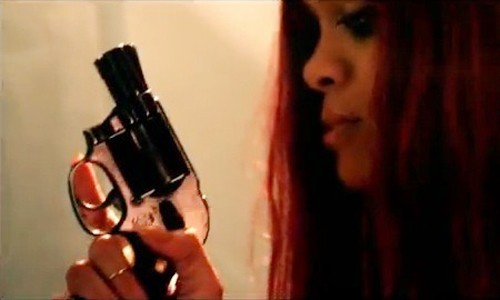I’m not a fan of Rihanna. Her music is obnoxious and her choice in hair dye is ridiculous. But critics are up in arms over the music video for her song “”Man Down”” and, for once, I’m siding with Riri.
In the video, Rihanna plays a fictional character, a woman who dances at a club with a stranger, then refuses him. There’s an implied rape scene. But the part that has media watchdog groups enraged is the part when she shoots her attacker.
Earlier this month, the Parents Television Council issued a response lamenting Rihanna’s waste of a “”golden opportunity”” to reach out to sexual assault victims. The lyrics of the song clearly express regret (“”‘Cause I didn’t mean to hurt him / Coulda been somebody’s son / And I took his heart when / I pulled out that gun””), but the PTC saw only a “”a cold, calculated execution of murder in primetime.””
“”Instead of telling victims they should seek help, Rihanna released a music video that gives retaliation in the form of premeditated murder the imprimatur of acceptability,”” said PTC spokeswoman Melissa Henson.
Translation: “”Hey. Rihanna. That whole victim thing? You’re doing it wrong.””
The PTC and other detractors of “”Man Down”” see a story about a rape victim who tries to reclaim what’s been taken from her, albeit violently, and they say: “”You’re not being a good victim.””
When we talk about rape prevention, we don’t ever say, “”Rapists shouldn’t rape.”” That’s partially because we want it to be common sense, but also because we imagine rape is a crime that can often be prevented by the victim. It’s sort of like when another driver slams into your car and everyone’s like, “”Well, maybe you could have avoided it if you hadn’t been driving.””
The PTC’s naiveté is only an example of the larger issue at play here, in which sexual assault victims are asked to take responsibility for a crime they didn’t commit except that it happened to them. The PTC chose to zero in on the depiction of murder because it’s an easy moral to teach. Don’t shoot people. Killing is bad. But no one ever says, “”Don’t rape people.”” Instead, it’s, “”Don’t get raped.””
If you’re a woman, maybe you can avoid being raped if you avoid dressing a certain way. Don’t dance the way you do. Don’t leave your drink alone. Don’t drink too much, period. Don’t walk home in the dark. Don’t walk home alone.
The problem is, in conversations such as these, the underlying message is this: If you do these things, and you get raped, you offered your attacker the opportunity.
And if, like Rihanna’s fictional character, you feel rage about it, you’re teaching little girls across America that it’s OK to be violent. Shame on you. Let me clutch my pearls and fan myself in shock over the idea that women might act out violently when they’re attacked.
While watching a man get shot in the head should make us uncomfortable, it should make us more uncomfortable that the PTC and other media watchdogs could so easily ignore the context of the music video. If the PTC wants to tackle how we view violence, it cannot go selectively blind.
Despite the enraged feminist in me, the one that says I should be allowed to do whatever I want without fear of someone taking advantage of it, I will never leave my drink unattended. I always walk through dark parking lots with my phone in hand and hyper-alert. Because this is the real world, and people like the PTC keep giving aggressors a free pass.
— Kristina Bui is the copy chief for the Summer Wildcat. She can be reached at arts@wildcat.arizona.edu.









